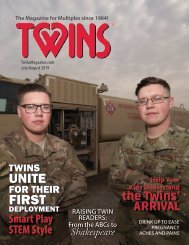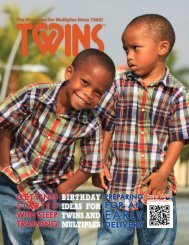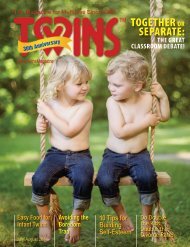Twins Magazine 2004 January February
Canadian family with four sets of twins sets Hardwired to Connect HMO forced to pay for TTTS surgery Holiday Survival Guide Oh my word! RSV season symptoms and strategies Sparkling Snowflakes The best-laid plans The hamster project Those “loving feelings” are hard to find Twins galore Two treatments help TTT babies Uh-oh! Toddler Trials and Training What causes monozygotic twinning Whining wears on single mom Help! I need somebody…
Canadian family with four sets of twins sets
Hardwired to Connect
HMO forced to pay for TTTS surgery
Holiday Survival Guide
Oh my word!
RSV season symptoms and strategies
Sparkling Snowflakes
The best-laid plans
The hamster project
Those “loving feelings” are hard to find
Twins galore
Two treatments help TTT babies
Uh-oh! Toddler Trials and Training
What causes monozygotic twinning
Whining wears on single mom
Help! I need somebody…
You also want an ePaper? Increase the reach of your titles
YUMPU automatically turns print PDFs into web optimized ePapers that Google loves.
Hardwired to Connect: The
New Scientific Case for
Authoritative Communities
A report to the nation from the Commission on Children
at Risk, a panel of leading children’s doctors, research
scientists and youth service professionals.
The Commission on Children at Risk is sponsored by
YMCA of the USA, Dartmouth Medical School and the
Institute of American Values.
Principal report authors:
Kathleen Kovner Kline, M.D., principal investigator
Dartmouth Medical School
Arthur C. Maerlender, Jr., M.D., co-investigator
Dartmouth Medical School
Order the reports for $7 from:
www.americanvalues.org
Children are born with two basic needs:
connecting with people and finding
spiritual meaning in life.
on what it means to be a good person. Strengthening
“authoritative communities” is key to the changing the
pathology of our culture. And the primary “authoritative
community” for the child is the family.
Broken families may head the list of cultural ills infecting
our children, but there are more. “Unrestrained individualism
has had untoward results for our society,” Kline said, “as
has hedonism in work, money, sex or consumerism.”
Sacrifice for the good of the community and for the good
of the family needs to be restored. “Child-rearing entails
ongoing sacrifice of one’s immediate needs, rewarding longterm
gratification,” Kline said.
With the enormous amount of time Americans devote to
work and the hours children and parents spend at computers
and in front of the TV, little time is left for family.
Over the past few decades, religious training has declined
in importance, and has even come to be viewed as suspect by
some parents. Furthermore, society has, from time to time,
declared that God is dead.
“Part of the suspicion is whose religion [will rule in our
society],” Kline explained. “The historic American ethos is
American Protestantism and we are pluralistic. It is our
strength and our challenge. Our initial impulse was to ban
religion from the public square. The reality is we all have a
need to connect with the sacred.”
To the parent who takes the stand, “I’m not going to give
A summary of the scientific
evidence
In searching for strategies to improve outcomes for children,
the Commission reviewed research on the brain
and human behavior from the last two to five
years. Among the main scientific findings are:
" The mechanisms by which we become and stay
attached to others have a biological basis and are
discernible in the basic structure of the brain.
" Nurturing environments, or the lack of them, influence the development
of brain circuitry and how genes affect behavior.
" The old ``nature versus nurture” debate—focusing on whether heredity
or environment is the main determinant of human conduct—is no
longer relevant to serious discussions of child well-being and youth programming.
These findings suggest that strong nurturing can reduce or
eliminate the harmful effects of genes that are associated with aggression,
anxiety, depression or substance abuse.
" Primary nurturing relationships influence early spiritual development,
and spiritual development can influence us biologically in the same ways
that primary nurturing relationships do. For instance, spirituality and religiosity
can be associated with lower levels of stress hormone (cortisol),
more optimism and commitment to helping others.
" The human brain appears to be organized to ask ultimate questions and
seek ultimate answers.
Three big ideas from the report
1. Surrounding kids with a richly nurturing environment from birth through
adolescence is critical to promoting their healthy physical, emotional, moral
and spiritual development.
2. Positive social, moral and spiritual development is integral to the healthy
overall development of children and youth, and depends on kids receiving
consistent and effective nurture from committed and caring adults.
3. Nonacademic nurture is done largely by families, neighborhoods, community
groups and religious organizations—what the Commission calls
“authoritative communities.” Taken as a whole, these institutions have
been growing weaker when we need them to be much stronger.
"Hardwired" continued on page 27
www.TwinsMagazine.com JANUARY/FEBRUARY 2004 25

















